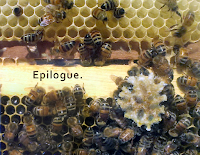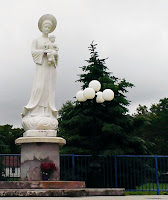So it happens that 3 lessons and 1 holiday have passed since our last
update and I am way overdue in writing Part 2. Issues regarding
phonetics are largely settled, as there does not seem to be any more new
thing that I have forgotten to mention. For lessons 2 to 4, Valerio
learns some basic grammar and vocabulary.
A First Note
Foreign-language classes face a perennial dilemma in the sense that one can prioritise
1) Learning how to say or write anything in a language, or
2)
Learning specific stock phrases for practical situations such as
ordering dishes, shouting for help in emergencies, explaining yourself
to the police, or flirting.
It is usual, at least in the courses
that I have attended, to juggle both of these priorities according to
the needs of each student. However, I am going to place some more weight
on the former focus because
1) Valerio asked for it,
2) Grammar allows for a more flexible and therefore more formidable command of a language, and
3)
If you rely on a phrasebook to flirt (for example) and then the
conversation moves on to more specific things, then it becomes very
awkward very quickly.
If unprepared, native speakers of Mandarin
are in for a hard slog when they pick up a language such as French,
German or Spanish, all of which are rich in grammatical artifacts like
gender, declension of nouns according to case, conjugation of verbs
according to pronoun, and tenses for actions that happened in the past,
in the present, in the future, in the future but before an
earlier-mentioned future event, a hypothetical past event after another
hypothetical event further in the past, or suchlike. In contrast,
Mandarin Chinese is blessedly free of such rules, and it becomes easy to
write the language off as something grammarless. That said, I shall
prove this wrong shortly.
Scope of Grammar: Copula, simple
verbs, phrasal verbs, negation, tenses, imperative voice, passive voice,
questions, conjunctions, sentence structure, subordinate clauses
The
idea of lessons 2 to 5 two was to teach the bare skeleton of the
language in the hope that it becomes something like a form into which
you can just fill in the blanks to suit any purpose, which is fine if
you don't try to be too adventurous. Let's try an example:
我是人 - I am a human being
This is a copula sentence. We learn here that 是 is the Mandarin from of "=".
Now for the case that I = cat, we say: 我是猫 - I am a cat
Or for the case that I = police officer: 我是警察 - I am a police officer
Suppose you are neither a cat nor a police officer. In this case we use the character 不 for negation:
我
不是猫。我
不是警察。
There
is a second noun that means "to be" in Mandarin. This could be a
problem for English, French or German native speakers, who can then go
and run to the Swedish and Spanish speakers for help, because both of
the latter also have two such nouns roughly corresponding to the
Chinese:
是 (to be a thing, to be equivalent to) ≈ Ser ≈ Vara
在 (to be somewhere, to be doing something) ≈ Estar ≈ Finnas
The negation for "to have" is trickier because it uses a different character, 没. For example:
我
没有钱 - I don't have money; not *我不有钱
The negation of an imperative verb is also different:
走开!
不要走开/
别走开! - Go away! Don't go away! not *不走开
On top of these, we seem to run into a special class of verbs whose negations go in the middle:
上去! - Go up! (Go-up away)
我上
得去。 - I can go up. (I go-up ~DE away)
我上
不去。 - I can't go up. (I go-up not away)
As
a student of Spanish I am extremely grateful that the language has a
single word "no" that can negate anything. For a person without that
special sixth sense that Mandarin speakers possess by virtue of having
grown up speaking the language, it probably has to be taught case by
painstaking case.
I forgot to mention that despite not having tenses, Mandarin has a way of dealing with time:
我以前 来
过这里。 - I've been here before (I in-the-past come ~GUO here)
我以后
会去 那里。 - I will go there in the future (I in-the-future ~HUI go there)
The
way one asks a yes/no question is also unique, but this is a less
surprising thing for Mandarin as many languages seem to do so each in
their own way.
English: You are a cat.
Are you a cat? (Word order change)
French: Tu es un chat.
Est-ce que tu es un chat? /
Es-tu
un chat? (Added phrase "est-ce que" in front to indicate a yes/no
question. Alternatively, a word order change can also be used)
Spanish: Eres un gato.
¿Eres un gato
? (Inflection change)
Finnish: Olet kissa. Olet
ko kissa? (Suffix -ko on verb to indicate yes/no question)
Mandarin: 你是猫。你是猫
吗?/你
是不是猫?(Literally: You are cat ~MA? You are are-not cat? The first one uses a particle, the second presents both yes and no options)
Scope
of vocabulary: Basic action verbs, modals, positions, words specific to
(Valerio's) everyday life, time (days of the week, months, date, time
of day, relative time), numbers and quantifiers
Here, we
treat knowledge of vocabulary as a repository of words to fill in the
blanks in a grammatical scaffold. Here, some sense of priority is
needed. One of the first verbs that I learned while learning French was
"pendre la crémaillère", which means to throw a housewarming party.
Having no occasion to ever pendre la crémaillère or to see someone else
do it afterwards, this figure of speech fell into disuse. For want of
efficiency, the most commonly-used and relevant vocabulary should be
taught first.
I relate to my first attempt to learn Indonesian
six years ago, when my army unit held an exchange with the Indonesians.
We were given a crash course of two to three weeks in the language, and
then sent into the country to talk to the locals. Our Indonesian buddies
were supposedly also trained in English to prepare for our visit, but
they gave up the moment we tried our Indonesian on them. The period of
the exercise was slightly over one week, so we had to learn the language
in a hurry. How I eventually did it was:
1. Go out and talk
2. Find something which I don't know the word for (e.g. I need the word for "sometimes")
3. Ask the Indonesians for the word (they say "kadang-kadang")
4. During rest time, read up on and learn all related terms (jarang = seldom; selalu = always; sering = often)
In
this way, acquiring vocabulary became intimately coupled with what I
needed in my day-to-day doings. Much of the vocabulary taught in Lesson 4
relied on the experience of trying to answer questions like these in
small talk:
- Where are you going now? - - We are going outside (
keluar) -
- What time is it? - - It is now 1 p.m. (
jam satu) -
- When will you be going home? - - Next Tuesday (
selasa depan) -
In
the lesson notes, the diagrams that I used in the joint exercise were
duly and accordingly revised to teach the Mandarin equivalents of the
vocabulary.
As
anyone who is learning a new language would know, learning words for
communicating politeness and good intentions is a key component of not
getting murdered by a mob in a foreign land. I think Valerio knows most
of it already, but maybe he can learn them again in a future lesson.
Meanwhile, I had better sign off before I get too carried away and try
to write down every single topic in this update.































